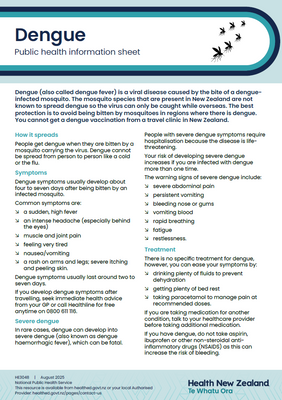Dengue - English - HE3048

The full resource:
Dengue (also called dengue fever) is a viral disease caused by the bite of a dengue-infected mosquito. The mosquito species that are present in New Zealand are not known to spread dengue so the virus can only be caught while overseas. The best protection is to avoid being bitten by mosquitoes in regions where there is dengue. You cannot get a dengue vaccination from a travel clinic in New Zealand.
How it spreads
People get dengue when they are bitten by a mosquito carrying the virus. Dengue cannot be spread from person to person like a cold or the flu.
Symptoms
Dengue symptoms usually develop about four to seven days after being bitten by an infected mosquito.
Common symptoms are:
- a sudden, high fever
- an intense headache (especially behind the eyes)
- muscle and joint pain
- feeling very tired
- nausea/vomiting
- a rash on arms and legs; severe itching and peeling skin
Dengue symptoms usually last around two to seven days.
If you develop dengue symptoms after travelling, immediately seek health advice from your GP or call Healthline for free anytime at 0800 611 116
Severe dengue
In rare cases, dengue can develop into severe dengue (also known as dengue haemorrhagic fever), which can be fatal.
People with severe dengue symptoms require hospitalisation because the disease is life-threatening.
Your risk of developing severe dengue increases if you are infected with dengue more than one time.
The warning signs of severe dengue include:
- severe abdominal pain
- persistent vomiting
- bleeding nose or gums
- vomiting blood
- rapid breathing
- fatigue
- restlessness
Treatment
There is no specific treatment for dengue, however, you can ease your symptoms by:
- drinking plenty of fluids to prevent dehydration
- getting plenty of bed rest
- taking paracetamol to manage pain at recommended doses
If you are taking medication for another condition, talk to your healthcare provider before taking additional medication.
If you have dengue, do not take aspirin, ibuprofen or other non-steroidal anti-inflammatory drugs (NSAIDS) as this can increase the risk of bleeding.
Prevention
The main method of prevention is to avoid mosquito bites when overseas.
For most travellers, there are no drugs or vaccines available to prevent dengue.
To avoid being bitten outdoors:
-
use insect repellent. DEET is best for preventing bites from mosquitoes which carry dengue and other mosquito borne illnesses. Recommended concentrations are 20% to 50% for adults and 20% to 30% for children. Always check the product instructions before use, especially for infants, and speak with a doctor or pharmacist if you require more advice.
-
when using sunscreen, apply repellent over the top of sunscreen.
-
wear light-coloured protective clothing such as long-sleeved shirts, long pants and hats. Clothing can be treated with repellent.
-
use zip-up screens on tents.
-
wear hats and shoes (rather than sandals).
-
you normally find more mosquitoes around in the early morning and late afternoon, so it’s important to be particularly careful during these times.
To avoid being bitten while inside it is best to have:
-
screens on doors and windows
-
insect sprays.
-
electric insect-repellent devices, or mosquito coils.
-
permethrin insecticide on clothes (permethrin can be bought at Travel Medicine Clinics).
-
a mosquito net over your bed at night (you can spray this with permethrin if you wish).
-
turn on air conditioning, if you have it. Air conditioning is very effective at keeping mosquitoes out of a room.
For more information
For further advice on mosquito-borne illnesses and travel advisories, visit: safetravel.govt.nz
For more information on dengue fever and how to stay healthy when travelling, visit: Dengue
For health advice call Healthline for free on 0800 611 116 or contact your usual doctor or healthcare provider.